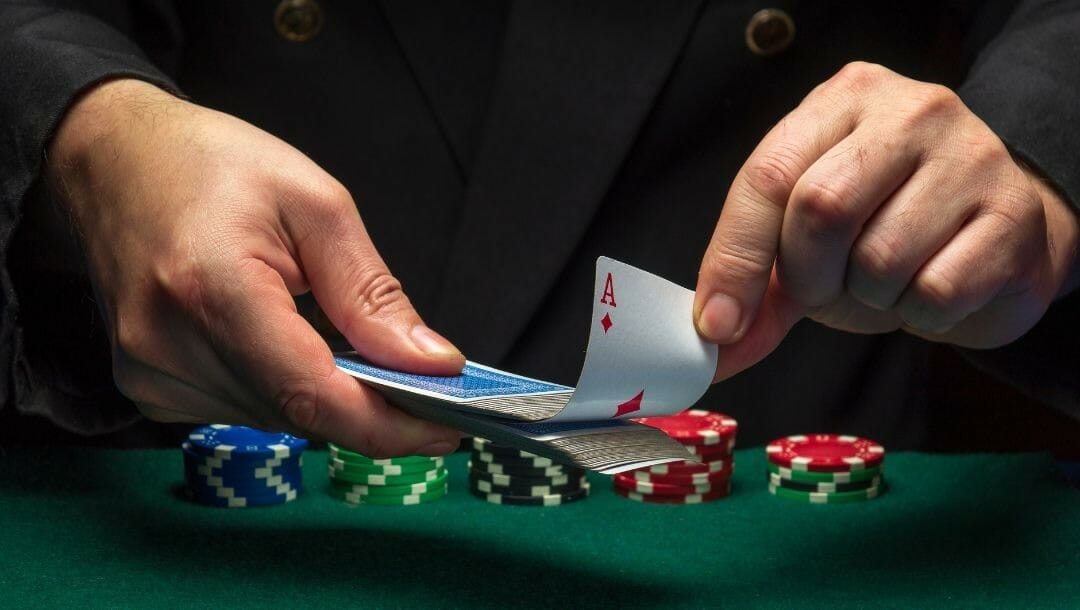
We can’t with any certainty know whether players in ancient China and Egypt tried to cheat during games of chance. Or even whether enterprising 17th-century gamblers tried to rip off the first known public gambling house, the Ridotto in Venice, Italy.
What we do know is that since the late 19th century when Monte Carlo in Monaco brought glamor to gambling and Nevada legalized casinos in 1931, enterprising thieves have tried to cheat at casino table games, slot machines and even online casino games.
Let’s look at some of the craziest methods and attempts to cheat land-based and online casinos over the years and how these establishments have responded.
How Do You Cheat a Casino?
Whether you play at a casino online or take on the dealers in Vegas, you’re always aware that someone, somewhere is trying to cheat the system. Over the years, these methods have become more and more sophisticated. Here are some of the ways people have tried to cheat.
Card Counting
Card counting is one of the most well-known methods used to gain an edge in games like blackjack. It involves keeping track of the cards that have been dealt to predict the likelihood of favorable cards remaining in the deck. While not technically cheating, casinos have implemented countermeasures, such as reshuffling decks and banning skilled card counters.
Crazy attempt – Who can forget the group of MIT students known as the MIT Blackjack Team? The MIT Blackjack Team, led by various team managers and comprising talented students and professionals, utilized a system known as the “Hi-Lo” count. This involved assigning point values to different cards and keeping track of the ratio of high cards (10s, faces and aces) to low cards (2s to 6s) remaining in the deck.
The team members would discreetly signal each other when the card count favored high cards, indicating a higher probability of favorable hands. They would then increase their bets substantially to maximize their winnings during those favorable conditions.
The team’s exploits gained widespread media attention and were immortalized in the book “Bringing Down the House” by Ben Mezrich, which later served as the inspiration for the movie “21.”
Countermeasures – Casinos constantly adapt their security to catch card counters. Responses include increased deck shuffling, changing deal procedures, back-offs and bans, better surveillance, rule variations and intense detection training of staff.
Marked Cards and Collusion

Another common form of cheating is using marked cards or collaborating with other players. Marked cards have hidden markings that allow cheaters to identify specific cards. Collusion occurs when players work together to cheat the casino, signaling information about their hands to one another.
Crazy attempt – One of the craziest and most notorious examples of people using marked cards and collusion to cheat a casino was the Tran Organization case. In the mid-2000s, a group of individuals led by Van Thu Tran and her husband Phuong Quoc Truong, also known as “Pai Gow John,” orchestrated an elaborate cheating scheme that targeted 28 casinos across the United States and one in Canada, defrauding them of over $7 million. Over 47 people were indicted.
Countermeasures – Since the high-profile Tran Organization scandal, casinos have upped their game. New security measures include increased surveillance, regular pit inspections, better-trained staff, increased dealer-player interaction, collaboration with authorities, anonymous play discouraging communication with other players and random seat assignments.
Past Posting and Top Hatting
In the realm of roulette, past posting involves placing chips on the winning number after the ball has already landed. Top hatting refers to adding chips to a winning bet after the outcome has been determined. Both methods involve altering bets after the results are known, giving cheaters an advantage.
Crazy attempt – The most infamous exponent of past posting and top hatting was gambler Richard Marcus who operated in the late 1970s. Marcus developed a cheating technique known as “The Savannah” and targeted roulette tables in Las Vegas casinos.
By utilizing a combination of past posting and top hatting, Marcus was able to increase his winnings significantly. His cheating spree eventually came to an end when casino surveillance teams became suspicious of his consistent success and began closely monitoring his activities. They eventually caught him in the act and exposed his cheating methods.
Countermeasures – Along with all the usual increases in surveillance, training and staff vigilance, casinos have also employed other measures like new chip placement rules, chip inspections, chip color changes, new chip technology like RFID (Radio-Frequency Identification) technology embedded in their chips and collaboration with law enforcement.
Slot Machine Manipulation

Over the years, individuals have attempted various techniques to manipulate jackpot slot machines. This includes using counterfeit coins, manipulating the machine’s mechanics or exploiting software vulnerabilities.
Crazy Attempt – In the 1980s and 1990s, Tommy Glenn Carmichael created a device known as the “light wand” to manipulate slot machines. The light wand was essentially a modified flashlight that could blind the optical sensors within the slot machine.
By inserting the device into the machine’s coin slot, Carmichael could trick the machine into thinking it was continuously paying out coins. Carmichael cheated until 1996 when he was caught by the Nevada Gaming Control Board. He was subsequently arrested and sentenced to prison.
Countermeasures – One of the most-attacked games in casinos is slot machines. This has led casinos to implement sweeping security responses. These measures can include sealed doors and compartments, tamper-evident seals, security screws, networked central monitoring systems, frequent inspections and collaboration with manufacturers and law enforcement.
Online Casino Fraud
With the rise of online gambling, new forms of cheating have emerged. Some players have resorted to using multiple accounts to collude against opponents or manipulate software to gain unfair advantages.
Crazy attempt – Who could forget the case of Russ Hamilton and the UltimateBet scandal? Hamilton was a former World Series of Poker champion and consultant for the online poker site UltimateBet.
In the mid-2000s, authorities found that Hamilton had engaged in a large-scale cheating scheme that defrauded online poker players out of millions of dollars. Hamilton and his accomplices had access to an administrative “superuser” account, which allowed them to see the hole cards of other players during online poker games.
The fraud remained undetected for several years until a group of players conducted investigations into suspicious patterns and statistical anomalies in their gameplay experiences on UltimateBet and shared their findings and suspicions online. In 2008, an independent investigation confirmed the cheating allegations and Hamilton and his associates were indicted for fraudulent activities on UltimateBet.
Countermeasures – Given the breadth of online gaming options available, from online slot machines to casino-based online betting, countermeasures to fraudsters and hackers are primarily regulatory and technological. Security measures include secure encryption of financial player data, more stringent licensing and regulation by authorities, thorough account verification, anti-money-laundering procedures, fraud detection software and close collaboration with online payment providers. A more recent innovation is the use of cryptocurrencies and blockchain technology.
Play Safely With Borgata Online
Register with Borgata Online to enjoy the most secure online gaming experience available. Whether you’re looking to play the best online slots for real money or live dealer casino games like blackjack and poker, Borgata Online offers the safest and most enjoyable online gaming experience.
